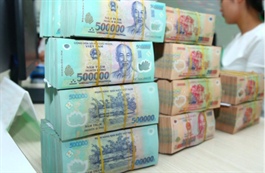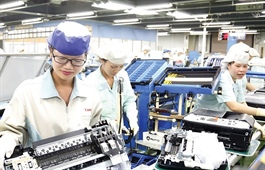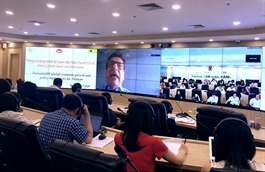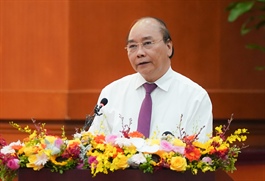Legal reinforcement to FDI appeal
Legal reinforcement to FDI appeal
The amended Law on Investment and the Law on Enterprises will improve the quality and efficiency of attracting domestic and overseas investment resources in Vietnam.

Pham Duy Khuong, Managing director, ASL LAW
|
With Vietnam’s increasingly dynamic economic integration, new or imminent free trade agreements have brought many more opportunities to local firms and opened many directions of investment for foreign financiers in the country. Transfer of foreign direct investment (FDI) from China to ASEAN countries is strongly taking place. Hence, on June 17, the National Assembly passed the amended Law on Enterprises and Law on Investment, creating a significant foundation to attract further FDI into Vietnam.
Investment law effects
Reduction of conditional business lines is one of the important contents in the amended Law on Investment because the conditions that business lines require in the law are a barrier for people to invest in such business lines in Vietnam. With the desire to open the market, the reduction of conditional business lines has helped remove barriers for investors to create a simpler and more efficient business environment.
Moreover, according to the current law, although Vietnam has made a commercial service commitment with the World Trade Organization since 2008, it has now been more than 10 years so the number of commercial service sectors has become much more diverse with many uncommitted sectors in such a commitment.
Hence, financiers will face many difficulties in investing in these sectors in Vietnam, when they may not know clearly whether there are limitations or conditions thereof. Therefore, the new Law on Investment stipulates a list of sectors and industries with conditional market access for them according to the opt-out approach, contributing to improving transparency and feasibility in applying Vietnam’s commitment to the open market under the new-generation free trade agreements.
With the introduction of many incentives and investment support for foreign investors in Vietnam, 2019 and even the first half of 2020 are bright spots in attracting FDI into Vietnam, but based on analysis of FDI, this capital source mainly focuses on processing and manufacturing industries, which however do not require high-skilled labour and it does not create a basis for further training.
Hence, this amended law has focused on issuing preferential policies and support to high-tech enterprises, startup projects, research and development centres, and production of new materials, new energy, clean energy, and IT products. Since then, this has facilitated the attraction of selective and qualified FDI sources into Vietnam. Moreover, the amended law also provides for the possibility that the prime minister may apply special incentives (which allow a maximum of 50 per cent more than the highest level in comparison with the current law), thereby this can help the government to make timely policies to attract strong current FDI inflows.
In Vietnam’s legal system, the Law on Investment is seen as a “common law” to regulate investment-related issues. Hence, issues related to investment will first have to follow the provisions of the law, but there are still overlaps of the current law with other specialised laws when dealing with an investment-related issue.
For example, the Law on Investment stipulates that projects not subject to approval will not have to conduct any related procedures before implementation. However, the Law on Housing states that any housing construction venture must carry out investment-related procedures prior to implementation.
This overlap has made investors confused in the proper application of documents and procedures of projects. Thus, the new law amended 10 groups of regulations to be more consistent with the provisions of specialised laws such as those on the environment, housing, and land.
Meanwhile, the amended Law on Investment has repealed unnecessary administrative procedures, such as the regulation on approving policies for schemes with capital of VND5 trillion ($217.4 million).
In addition, the law also extends the investor's autonomy as stipulated in Article 41 that “during the implementation of a project, the investor has the right to adjust the target, and transfer in part or in whole projects, merge projects, or split a project into many projects and other contents.”
Enterprise law effects
The current Law on Enterprises has regulated that prior to running a business, companies must complete five administrative procedures: business registration, making a seal, notifying of the seal sample, opening accounts, and notifying account information to the registrar of business. However, the amended Law on Enterprises abolishes the procedure of notifying the seal specimen to the business registration agency for publicly posting on the National Enterprise Registration Portal. Thereby, this may lead to the reduction of cumbersome procedures and simplification of operation of companies with the general aim of creating a more effective business environment.
The amended law has altered a number of regulations to protect the rights and interests of shareholders or groups of shareholders that own the small rate of shares in the company. It has decreased the rate of shares for performing a few rights from 10 to 5 per cent.
Therefore, shareholders or groups of shareholders only owning 5 per cent of the total number of common shares can carry out some rights as prescribed. In addition, the amended law has abolished the regulation which regulates that shareholders or groups of shareholders owning 10 per cent or more of common shares are allowed to perform their rights on their shares only when they have owned their shares for a consecutive period of at least six months or more.
This is because, in fact, although many shareholders own the majority of shares of the company, they cannot perform their rights and legitimate interests since they do not meet the requirements of the terms of owning shares. Therefore, these regulations are to protect the rights and interests of shareholders or groups of shareholders in the business, which is an important basis to attract investing sources into the business.
From that, Vietnam expects the attraction of strong FDI sourcing inflows moving from China into ASEAN countries.






















